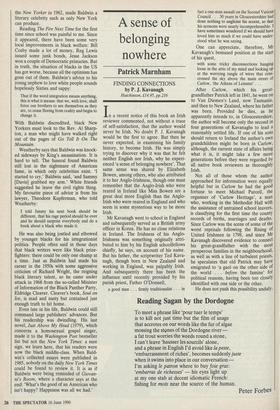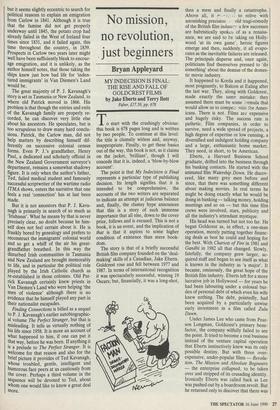A sense of belonging nowhere
Patrick Marnham
FINDING CONNECTIONS by P. J. Kavanagh
Hutchinson, .04.95, pp.216
In a recent notice of this book an Irish reviewer commented, not without a trace of self-satisfaction, that the author would never be Irish. No doubt P. J. Kavanagh would be the first to agree. But then he never expected, in examining his family history, to become Irish. He was simply trying to discover why it was that he felt neither English nor Irish, why he experi- enced 'a sense of belonging nowhere'. That same sense was shared by Elizabeth Bowen, among others, who also attributed it to her Anglo-Irishness, though one must remember that the Anglo-Irish who were reared in Ireland like Miss Bowen are a great deal more English than the Anglo- Irish who were reared in England and who seem in some mysterious way to be more Irish.
Mr Kavanagh went to school in England and subsequently served as a British army officer in Korea. He has no close relations in Ireland. The Irishness of his Anglo- Irishness was something originally attri- buted to him by his English schoolfellows chiefly, he says, on account of his name. But his father, the scriptwriter Ted Kava- nagh, though born in New Zealand and working in England, was palpably Irish. And subsequently there has been the influence until recently provided by his parish priest, Father O'Donnell,
a good man . . . firmly traditionalist . . . in fact a one-man assault on the Second Vatican Council . . . 30 years in Gloucestershire had done nothing to anglicise his accent, so that his sermons were nearly incomprehensible. I have sometimes wondered if we should have loved him so much if we could have under- stood what he was saying.
One can appreciate, therefore, Mr Kavanagh's bemused position at the start of his quest,
with some tricky disconnections hanging loose in the attic of my mind and looking up at the worrying tangle of wires that criss- crossed the sky above the main street of Carlow, 'the Athens of Leinster' . . .
After Carlow, which his great- grandfather Patrick left in 1841, he went on to Van Diemen's Land, now Tasmania, and then to New Zealand, where his father was born. Provided he dies, as he apparently intends to, in Gloucestershire, the author will become only the second in four generations of Kavanaghs to lead a reasonably settled life. If one of his sons should return to Ireland the author's own grandchildren might be born in Carlow, although, the current state of affairs being what it is, it might take a few more generations before they were regarded by all native book reviewers as thoroughly Irish.
Not all of those whom the author approached for information were equally helpful but in Carlow he had the good fortune to meet Michael Purcell, the organiser of 'Carlow Heritage', a man who, working in the Methodist Hall with the assistance of untrained school leavers, is classifying for the first time the county records of births, marriages and deaths. Since Carlow was the scene of some of the worst reprisals following the Rising of United Irishmen in 1798, and since Mr Kavanagh discovered evidence to connect his great-grandfather with the most prosperous families in the neighbourhood, as well as with a line of turbulent priests, he speculates that old Patrick may have emigrated to 'a gaol on the other side of the world . . . before the famine' for political reasons, having been too closely identified with one side or the other.
He does not push this possibility unduly, but it seems slightly eccentric to search for political reasons to explain an emigration from Carlow in 1841. Although it is true that the famine did not get properly underway until 1845, the potato crop had already failed in the West of Ireland four times since 1831, and it failed again, this time throughout the country, in 1839. Prospects in Carlow two years later might well have been sufficiently bleak to encour- age emigration, and it is unlikely, as the author himself notes, that those taking the ships knew just how bad life for Inden tured immigrants' in Van Diemen's Land would be.
The great majority of P. J. Kavanagh's story is set in Tasmania or New Zealand, to where old Patrick moved in 1866. His problem is that though the entries and exits of the Kavanagh family are properly re- corded, he can discover very little else about his ancestors. He speculates, but is too scrupulous to draw many hard conclu- sions. Patrick, the Carlow man, did not help matters by describing himself dif- ferently on successive colonial census forms. Even P. J.'s grandfather, Henry Paul, a dedicated and scholarly official in the New Zealand Government surveyor's department, remains a somewhat shadowy figure. It is only when the author's father, Ted, failed medical student and famously successful scriptwriter of the wartime radio ITMA shows, enters the narrative that one feels a real 'connection' has at last been made.
But it is not ancestors that P. J. Kava- nagh is primarily in search of so much as `Irishness'. What he means by that is never precisely clear, no doubt because he him- self does not feel certain about it. He is frankly bored by genealogy and prefers to reconstruct the immigrants' colonial world and so get a whiff of the air his great- grandfather breathed. In this way the disturbed Irish communities in Tasmania and New Zealand are brought memorably to life, and in particular the political role played by the Irish Catholic church as re-established in those colonies. Old Pat- rick Kavanagh certainly knew priests in Van Diemen's Land who were helping 'the men of violence' although there is no evidence that he himself played any part in their nationalist escapades.
Finding Connections is billed as a sequel to P. J. Kavanagh's earlier autobiographic- al volume The Perfect Stranger, but that is misleading. It tells us virtually nothing of his life since 1958. It is more an account of what happened to him, if one can put it that way, before he was born. If anything it is a prelude to The Perfect Stranger. It is welcome for that reason and also for the brief picture it provides of Ted Kavanagh, whose troubled, gentle, intelligent and humorous face peers at us cautiously from the cover. Perhaps a third volume in the sequence will be devoted to Ted, about whom one would like to know a great deal more.



















































 Previous page
Previous page